Thank you for your patience. The hearing committee has deliberated and we are in unanimous agreement that there’s no discipline short of disbarment that would be appropriate in this case given the magnitude of the offenses we have found and the effect upon the profession and the public.
I do want to make some remarks as to why we reached our conclusion. This matter has been a fiasco. There is no doubt about it. It has been a fiasco for a number of people, starting with the defendants and moving out from there to the justice system in general. We’ve heard evidence over the last several days of how that came about. Though we are lawyers and a school administrator — we’re not psychologists — you have to ask yourself, “Why? Why did we get to the place that we got?”
It seems that at the root of it is self-deception arising out of self-interest. Mark Twain said that “when a person cannot deceive himself the chances are against his being able to deceive other people.”
Well, what we have here, it seems, is that we had a prosecutor who was faced with a very unusual situation in which the confluence of his self-interest collided with a very volatile mix of race, sex and class, a situation that if it were a plot of a John Grisham novel it would be considered to be perhaps too contrived. At that time he was facing a primary and yes he was politically naive. But we can draw no other conclusion that that those initial statements that he made were to forward his political ambitions. But having once done that and having seen the facts as he hoped they would be, in his mind the facts remained that way in the face of developing evidence that that was not in fact the case.
And even today one must say that in the face of a declaration of innocence by the attorney general of North Carolina, it appears the defendant still believes the facts to be one way and the world now knows that is not the case.
We are required under our rules to consider certain aggravating and mitigating factors — under Rule .0114W. And those are set forth in the rule and I’m going to say what aggravating and mitigating factors we have found.
We have found as aggravating factors dishonest or selfish motive, a pattern of misconduct, multiple offenses, refusal to acknowledge wrongful nature of conduct — in the respect of the handling of the DNA evidence; we do find that he has made some acknowledgement of his wrongful conduct in regard to the pretrial statements — the vulnerability of the victim — or the victims in this case and primarily the victims are the three young men who were wrongfully charged. And we find also as an aggravating factor substantial experience in the practice of law.
As mitigating factors we find absence of a prior disciplinary record, a reputation for character. We expressly find that the aggravating factors outweigh the mitigating factors.
This matter appears to be an aberration in a couple of respects. It appears to be an aberration in the life and career of Michael Nifong. It appears also to be an aberration in the way justice is handled in North Carolina. It’s an illustration of the fact that character — good character — is not a constant. Character is dependent upon the situation. Probably any one of us could be faced with a situation at some point that would test our good character and we would prove wanting. And that has happened to Mike Nifong. But the fact that it has happened and the fact that we have found dishonesty and deceitful conduct requires us in the interest of protection of the public to enter the most severe sanction that we can enter, which is disbarment.
I want to say something about who the victims are here. The victims are the three young men to start with, their families, the entire lacrosse team and their coach, Duke University, the justice system in North Carolina and elsewhere. And indeed prosecutors — honest, ethical, hard-working prosecutors throughout the nation — as we’ve heard through anecdotal evidence are victims of this conduct. And in particular the justice system is a victim of the way this was taken out of — this Mr. Smith testifying — taken out of the courtroom and put in the hands of the public and not only the public in general but into a media frenzy unprecedented in anyone’s experience.
As I think anyone who has sat through this entire proceeding — we’ve been here now on the fifth day — that you can’t do justice in the media, you can’t do justice on sound bites. The way to arrive at a determination of the facts is to hear in a fair and open proceeding all of the evidence and then for the trier of fact to determine what the facts are. And we’ve done that this week.
That did not happen and was not going to happen apparently in the Duke lacrosse case. The justice system righted itself somehow so that at the end of the day there was indeed a declaration of innocence of these three young men. But it was done with backup systems in a way that was never designed to work as the justice system should work. Perhaps that was set in motion by the state bar’s initial complaint, filed on December 28, 2006, that shortly thereafter led to the recusal of Mr. Nifong from the Duke lacrosse cases. That was a controversial decision, I believe. Certainly unprecedented that the state bar would take disciplinary action against a prosecutor during the pendency of the case when indeed the presiding judge had concurrent and coextensive disciplinary jurisdiction. That was the step — although we were not privy to the decision to do that — I am sure that was a matter of serious debate as to whether to do that because that in itself took the justice system off track.
The other mechanism by which the system more or less righted itself was the involvement of the attorney general and the special prosecutors, who looked at it from a standpoint of prosecutors who were cognizant of their duty — the duty that was described here by Marshall Goodenow of the Mecklenburg County district attorney’s office and whom we found to be a very persuasive witness. And that led to something really very extraordinary, a declaration of actual innocence of the three defendants — something that could never have been accomplished even if the criminal case had proceeded before Judge Smith. And while we don’t know, it seems reasonably clear that one would predict that at the suppression hearing in February the case would have been dismissed. But it would have been dismissed with no declaration of innocence and indeed this entire controversy regarding the wrongful prosecution still hanging over the heads of the defendants and the justice system of North Carolina.
So perhaps that was the good thing that happened if one can find much of anything good out of this situation.
But the fact that if these extraordinary had not come to pass, leading to that declaration of innocence, raises another point that we should all be aware of, which is that the person who is the most powerful in the criminal justice system is not the judge and except at the end of the process it’s not the jury, it’s the prosecutor who makes the charging decision to start with.
The prosecutor, as any defense lawyer will tell you, is imbued with an aura that if he says its so it must be so. And even with all the constitutional rights that are afforded criminal defendants, the prosecutor merely by asserting a charge against defendants already has a leg up. And when that power is abused, as it was here, it puts constitutional rights in jeopardy. We have a justice system but the justice system only works if the people who participate in it are people of good faith and respect those rights.
And Mr. Nifong it must be said for whatever reason it does appear to us to be out of self-interest and self-deception, not necessarily out of an evil motive, but that his judgment was so clouded by his own self-interest that he lost sight of it and wandered off the path of justice and had to be put back on course again by again very extraordinary means.
This is also a case where due to the initial strong statements, unequivocal statements, made by Mr. Nifong, there was a deception perpetrated upon the public. And many people were made to look foolish because they simply accepted that if this prosecutor said it was true, it must be true.
When I think back to those early days in the spring of last year and we think of how public opinion was so overwhelmingly against these defendants and you think of the public aggravation that they suffered and then you look at how the truth came out slowly in small increments and look at the situation now as to what public opinion is there is a 180-degree turn. And those who made a rush to judgment based upon an unquestioning faith in what a prosecutor had told them were made to look foolish and many still do look foolish.
It is very difficult to find any good in this situation that brings us here. I can only think of a couple things. One is that there are very few deterrents upon prosecutorial misconduct. For very good policy reasons, prosecutors are virtually immune from civil liability. About the worst that can happen to them for the conduct of a case is that the case can be overturned. The only significant deterrent upon a prosecutor is the possibility of disciplinary sanction. And here the most severe sanction is warranted.
I want to briefly address a matter that was actually included in Mr. Nifong’s initial response to state bar briefings, which was to the effect that the word on the street was that the state bar was out to get a prosecutor and cited a couple of well-publicized cases in recent years involving prosecutors where it was widely perceived that there was insufficient discipline imposed.
And I just want to step back for a moment and speak not as the chair of this panel but as the chair of the Disciplinary Hearing Commission and note that in those two cases the situation was very different, although you could look at it and say that the harm that was caused by the conduct was graver. In both of those cases someone was actually wrongfully convicted of a capital crime. But in one of those cases where it was prosecuted there was no contention that there was any misconduct on behalf of the prosecutor that extended beyond loss of privileges. In other words, there was no allegation or proof of intentional wrongdoing and under the restrictions that we are under ... probably the maximum discipline that could be imposed was imposed. And indeed under the particular provision, the same one that we are dealing with here, Rule 3.8D as it was previously worded, the panel felt that there was a nondelible duty to know what’s in your file. And under most jurisdictions or the majority view, actually no discipline would be imposed.
In one case, which has recently been affirmed by the court of appeals, there was a dismissal based upon essentially the running of the limitations rule and we did not address the merits. But we applied the rules. We applied the rules in both of those cases and reached, in my opinion, the correct result. And in this case we have applied the rules and again we believe we have reached the correct result.
Every case is different but the case we have here is a clear case of intentional prosecutorial misconduct. So in addition to this being a deterrent to any prosecutorial misconduct, I would say that this should be a reminder to everyone that it’s the facts that matter. It’s not the allegations. And if you sit as a juror or if you sit at home watching your television about court proceedings, you have to carefully consider the facts and the evidence before you make a conclusion about something and not just trust someone who tells who it is so because that is someone who’s in a position who is supposed to know.
The other thing that may be good about this is to say that this is another opportunity to acknowledge based upon the actual testimony that we have heard over the last several days and to remind everyone — other than the testimony of Brian Meehan on Dec. 15, 2006 — no one had given testimony in a public hearing under oath in this matter until this week. This has given an opportunity to air some but not all of the evidence that may relate to this matter. After all, our purpose is limited to the disciplinary matter before us and the specific allegations only involve the law license of Mike Nifong. But we’ve had an opportunity over the last several days to hear additional evidence — and while it is really not within the purview of the panel to make such a pronouncement — I want to say again that we acknowledge the actual innocence of the defendants. And there is nothing here that has done anything but support that assertion.
Finally, I want it to be noted and it may seem to be a subtle distinction but it’s an important one, it relates to this underlying case, which is when this is recorded it should be noted not that the state bar disciplined Michael Nifong but that the Disciplinary Hearing Commission of the North Carolina State Bar, particularly this panel of the Disciplinary Hearing Commission disciplined Michael Nifong. That is important because it should illustrate to everyone that there has been a process here. The state bar in secret did not decide to take away the license of Michael Nifong to practice law. The state bar decided that they had evidence sufficient to go forward and seek to prove to an independent tribunal of triers of fact that his license should be taken away. And it took a long process culminating at this point in order to do that. And that’s due process. And that’s what was nearly hijacked in the case of the Duke lacrosse defendants.
Those are the only things that come to mind that are good about this entire situation. It’s been truly — a fiasco is not too strong a word. But it could have resulted from a lapse of character of practically anyone, not just in particular Mike Nifong. We’ve heard anecdotal evidence of the harm that it has caused. The actual harm is very difficult to get one’s arms around. But I certainly hope that this process will help assuage the harm and stop the ripples that seemed to start when the stone was thrown in the pond. They just got bigger and bigger. But hopefully they will ebb from this point forward.
We expect to enter a written order in the near future. I won’t put a timetable on it. It will take a little time. But again that will be a final order and I understand the defendant has waived his right to appeal.
So unless there is anything further for us to address, this proceeding is concluded. Thank you.
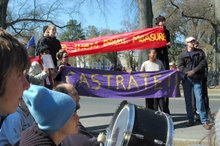




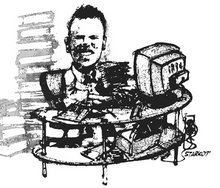
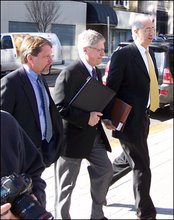
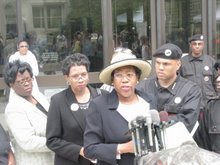
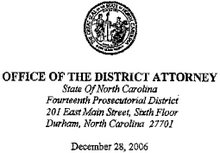
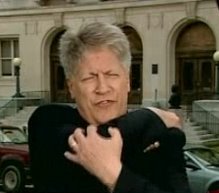



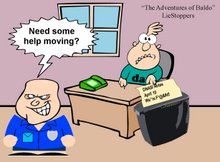

















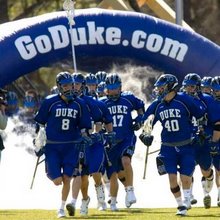

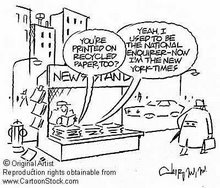

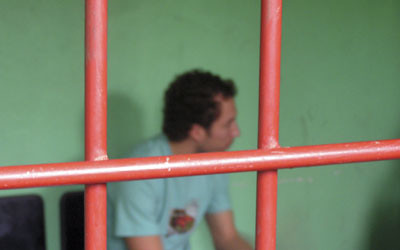



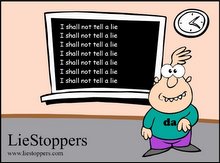






4 comments:
Carolyn says:
Williamson's integrity has been paramount throughout this. He has done a great deal to restore that integrity to NC justice - and is to be commended deeply for it. However, if I may, please, I would ask for the word 'fiasco' to be replaced by a word that better symbolizes what really went on - the word is 'terror'. As in Robespierre's reign of terror in France, Stalin's reign of terror in Russia, the Nazi's reign of terror in Germany, etc.
The basis of terror is helpless uncertainty. People you once thought were friends now shun you, laws you believed would protect you now threaten you with jail, certainty is now replaced with constant fear of a telephone, a letter, someone's lie, etc. The terror turns your father into a diabetic or kills your grandfather, it collapses your girlfriend on the floor sobbing so you have to pick her up and carry her for nearly two blocks, it reduces a mother to wretched helplessness as she watches her tall son collapse on a bed sobbing, it tapes vigilante posters on walls next to a cashier who won't look at you anymore. It is pure hell.
This wasn't a fiasco. This was a reign of terror orchestrated by a smirking, non-entity from a small town who thought nothing of destroying the lives of young men he envied merely in order to afford better lawn furniture or a vacation to Florida in his retirement. And the victims of his terror were helpless because his stupidity refused to acknowledge their intelligence, his self-centeredness was untouched by their suffering, his immorality was unmoved by the hell he had reduced their lives to.
The word 'fiasco' is too small, too insignificant to describe what Nifong unleashed on 3 young men and their world.
Brand writes:
There have been a few truly bright moments in this entire sorry mess. The comments of Mr. Williamson are nothing short of stunningly appropriate.
They were measured, evenhanded and well considered. Those remarks alone should resolve any doubts that the Bar or the Disciplinary Committee were on a "witch hunt" against Nifong. To the contrary, integrity and fairness fairly leap off the page of the transcript.
Save, perhaps, only the actual declaration of innocence by the Attorney General, these statements will be the ones most remembered over the years and decades as a summary of the case and the District Attorney's part in derailing justice and fairness.
That being said, I do not believe other parties, such as the Group of 88 and it's activist and grade-retaliatory members, the Duke administration, the NAACP or the MSM, should be allowed to use this to try to take themselves off the hook.
The activist members of the Group of 88 used this to further their own agendas in a blatant attempt to grab for more academic and political power.
The Duke adminstration was the epitome of spinelessness and pc-blindness in caving to those activists and in "investigating" and "evaluating" the very persons who caused the most harm to Duke University - the activist members of the Group of 88.
The MSM jumped on this case and spun it in politically correct manner that catered to their own paradigms, and those of special interest groups, without investigation, without checking facts and with full knowledge that their "spin doctoring" would create a social firestorm. To this day, spin remains more important than truth to the majority of the MSM's most visible mouthpieces.
It's not over yet. These groups also must be called to account.
Brand
My personal favorite part was...
"And even today one must say that in the face of a declaration of innocence by the attorney general of North Carolina, it appears the defendant still believes the facts to be one way and the world now knows that is not the case."
Meaning..... Nifong, you are either a psychopathic lunatic, or a liar!
"It appears also to be an aberration in the way justice is handled in North Carolina. "
Oh really?
Given that three days into the hearing NC judges were *still* willing to stand up and swear under oath that Nifong *currently* had a reputation for honesty, how is anyone supposed to believe that?
Post a Comment